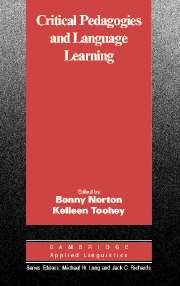Book contents
- Frontmatter
- Contents
- List of contributors
- Acknowledgments
- Chapter 1 Critical pedagogies and language learning: An introduction
- I RECONCEPTUALIZING SECOND LANGUAGE EDUCATION
- Chapter 2 Two takes on the critical
- Chapter 3 Critical multiculturalism and second language education
- Chapter 4 Gender and sexuality in foreign and second language education: Critical and feminist approaches
- Chapter 5 Assessment in multicultural societies: Applying democratic principles and practices to language testing
- II CHALLENGING IDENTITIES
- III RESEARCHING CRITICAL PRACTICES
- IV EDUCATING TEACHERS FOR CHANGE
- Author Index
- Subject Index
Chapter 4 - Gender and sexuality in foreign and second language education: Critical and feminist approaches
Published online by Cambridge University Press: 05 October 2012
- Frontmatter
- Contents
- List of contributors
- Acknowledgments
- Chapter 1 Critical pedagogies and language learning: An introduction
- I RECONCEPTUALIZING SECOND LANGUAGE EDUCATION
- Chapter 2 Two takes on the critical
- Chapter 3 Critical multiculturalism and second language education
- Chapter 4 Gender and sexuality in foreign and second language education: Critical and feminist approaches
- Chapter 5 Assessment in multicultural societies: Applying democratic principles and practices to language testing
- II CHALLENGING IDENTITIES
- III RESEARCHING CRITICAL PRACTICES
- IV EDUCATING TEACHERS FOR CHANGE
- Author Index
- Subject Index
Summary
Introduction
Over the years, a number of scholars have engaged in the study of how gender mediates second (L2) and foreign language (FL) learning in and out of the classroom. Several recent books and state-of-the-art reviews (Chavez, 2000; Ehrlich, 1997; Pavlenko, 2001a; Pavlenko et al., 2001; Sunderland, 2000a) provide a detailed discussion of these studies and do not need to be repeated here. Instead, in the present chapter, I will use a feminist poststructuralist framework to synthesize the findings of the recent studies and to discuss their implications for critical and feminist pedagogies in FL/L2 education.
Feminist poststructuralism and critical inquiry in FL/L2 education
While there are several approaches to feminist poststructuralism and critical inquiry, I see them sharing a common aim. Thus, I define feminist poststructuralism, outlined by Cameron (1992, 1997), Luke and Gore (1992a), and Weedon (1987), and critical inquiry in applied linguistics, outlined by Pennycook (2001), as approaches to language study that strive (a) to understand the relationship between power and knowledge; (b) to theorize the role of language in production and reproduction of power, difference, and symbolic domination; and (c) to deconstruct master narratives that oppress certain groups - be it immigrants, women, or minority members - and devalue their linguistic practices.
Similarly, recognizing differences between various pedagogical approaches, in the present chapter, I group together FL/L2 critical and feminist pedagogies that acknowledge and incorporate gender and draw on feminist poststructuralist thought in education (Davies, 1994; Jones, 1993; Luke & Gore, 1992a; Stanton & Stewart, 1995).
- Type
- Chapter
- Information
- Critical Pedagogies and Language Learning , pp. 53 - 71Publisher: Cambridge University PressPrint publication year: 2004
- 37
- Cited by

